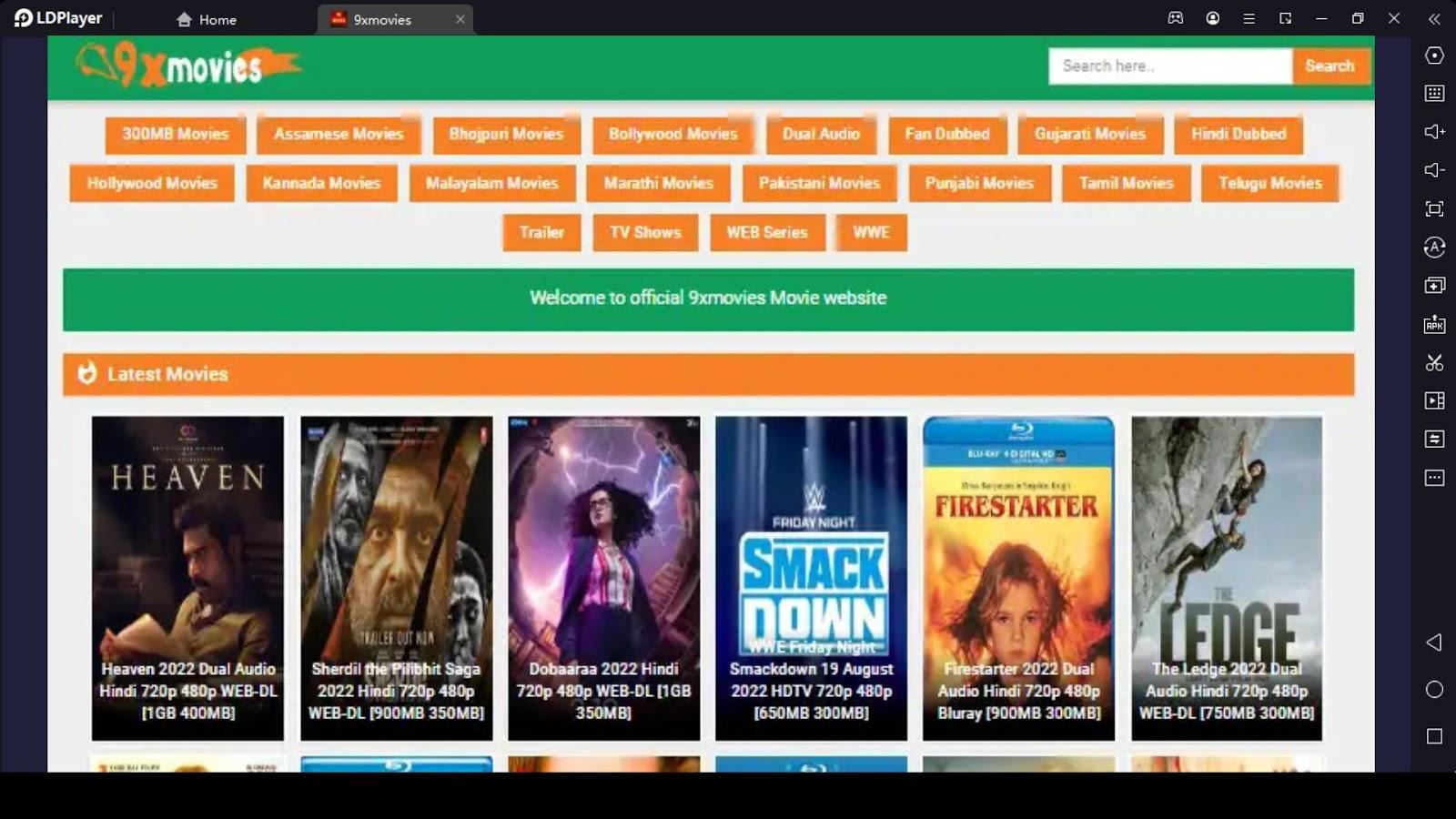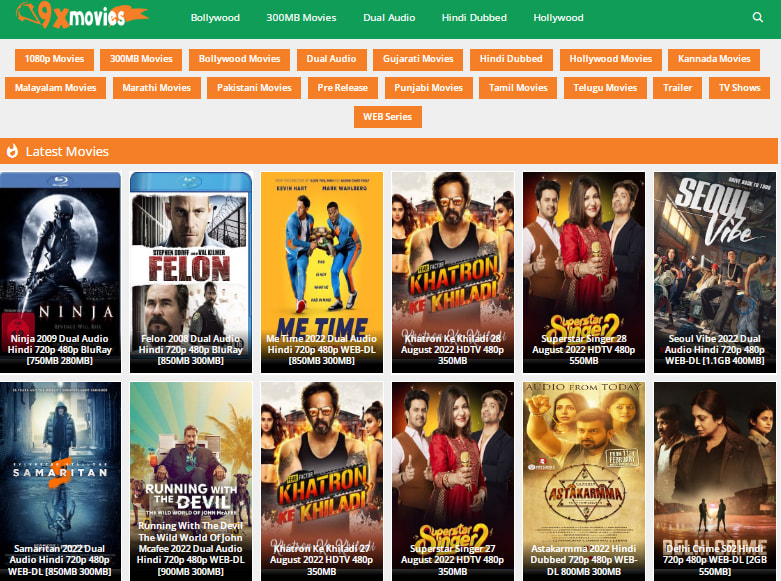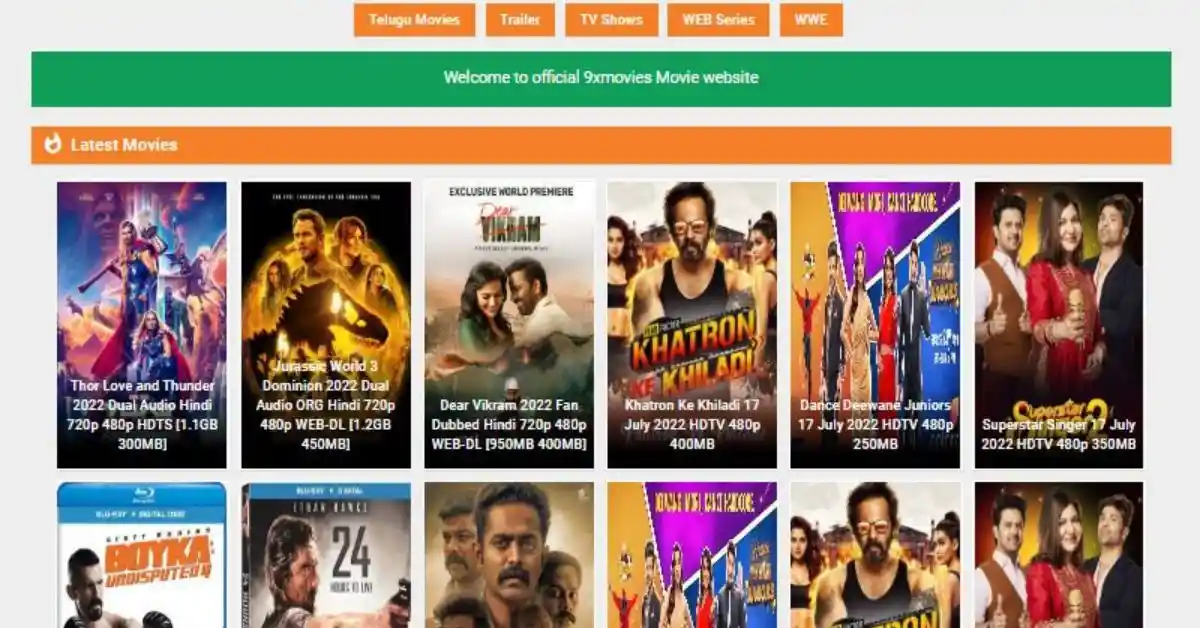Unveiling 9xmovies & Xmovies8: Is Free Movie Streaming Worth The Risk?
In an era dominated by streaming giants and on-demand entertainment, is the allure of free content simply too irresistible to ignore? The widespread existence of platforms dedicated to providing pirated movies and television series stands as a stark challenge to the conventional entertainment sector, promising immediate access to an extensive collection of content without incurring any monetary burden.
Sites such as 9xmovies and xmovies8 have become virtually synonymous with accessing the latest cinematic offerings from Bollywood, Hollywood, and various regional Indian film industries, frequently in resolutions rivaling those offered by legitimate streaming services. These platforms, however, function within a somewhat ambiguous legal environment, disseminating content through channels that lack proper authorization. While the guarantee of cost-free access undoubtedly holds substantial appeal, comprehending the ramifications associated with utilizing such services is of paramount importance.
9xmovies, in particular, has established a considerable online presence by extending a vast catalog of movies and TV programs available for immediate downloading. Users can navigate through an assortment of domain variations, including 9xmovies biz, 9xmovies win, and 9x movies press, to discover the most up-to-date content offerings. The site demonstrably caters to a diverse audience demographic, featuring dedicated categories for Telugu, Tamil, and Hindi-dubbed movies, thereby ensuring that a broad spectrum of viewers can readily find material that piques their individual interests. Further solidifying its attractiveness, 9xmovies furnishes a dedicated application for mobile devices. The 9xmovies app is intricately designed to streamline access to the most current South Indian films, particularly those dubbed in Hindi, thereby enhancing its user accessibility.
- Aaron May Chef Obituary Celebrating The Legacy Of A Culinary Icon
- Daniel John Gregory The Rising Star In The Spotlight
| Attribute | Details |
|---|---|
| Name | (Hypothetical example) Priya Sharma |
| Occupation | (Hypothetical example) Film Industry Analyst |
| Expertise | (Hypothetical example) Copyright law, digital content distribution, South Asian cinema |
| Education | (Hypothetical example) LLM in Intellectual Property Law, University of Delhi; MA in Film Studies, JNU |
| Professional Experience | (Hypothetical example) 10+ years experience in film industry research; consultant for major production houses; frequent commentator on digital media trends |
| Publications | (Hypothetical example) Numerous articles in academic journals and industry publications on copyright and digital media. |
| Website/Profile | (Hypothetical example) World Intellectual Property Organization (WIPO) |
The primary draw of these platforms, exemplified by 9xmovies, resides in their capacity to deliver content entirely free of charge. Users are empowered to delve into recent theatrical releases, enduring classics, and a vast array of international cinematic productions without the necessity of purchasing subscriptions or incurring individual rental or purchase fees. This combination of effortless accessibility and a remarkably expansive selection renders these sites exceptionally appealing, particularly among individuals seeking immediate entertainment options.
While these websites are certainly not the singular avenue for obtaining complimentary content, they serve as a clear representation of a broader societal phenomenon. The escalating demand for easily accessible and budget-friendly entertainment solutions has demonstrably fueled the proliferation of such platforms. While some users might lack full awareness regarding the inherent legal ramifications, the overarching reality remains that accessing content through these illicit channels invariably entails substantial risks, most notably concerning copyright infringement and the potential exposure to malware and other harmful software.
The capacity to stream movies directly online, as facilitated by platforms like 9xmovies, has significantly augmented their widespread appeal. Many users now enjoy the ability to view movies online through services such as Movies Anywhere, or alternatively, to explore the extensive libraries available from well-established streaming providers including Disney, Fox, Sony, Universal, and Warner Bros. While the concept of seamlessly connecting digital accounts to import previously acquired movies may initially seem enticing, the intrinsic risks associated with the content's dubious origin frequently outweigh any perceived benefits.
- Xhmstr Unveiling The Hidden World Of Modern Digital Artistry
- Zhang Jingchu A Rising Star Whorsquos Taking The World By Storm
The structured organization of content into distinct categories encompassing various genres, languages, and geographic regions ensures that a global audience can effortlessly access materials tailored to their specific preferences. The availability of both Bollywood and Hollywood productions, particularly those meticulously dubbed in Hindi, serves to extend the reach of these sites to an even broader and more diverse audience base. Furthermore, the option to download content in a range of resolutions, including 480p, 720p, and 1080p, enhances the attractiveness of these platforms, affording users a considerable degree of flexibility and ease of use when accessing their chosen entertainment.
The following table encapsulates the salient features of 9xmovies and analogous platforms, delivering a structured overview of their functionalities and the inherent risks associated with their utilization.
| Feature | Description | Implications |
|---|---|---|
| Content Availability | A comprehensive array of movies, television shows, web series, and diverse genres encompassing Bollywood, Hollywood, and Tollywood productions. | Direct contravention of copyright laws; heightened potential for exposure to malware, viruses, and other malicious software. |
| Access Methods | Options for direct downloading, real-time streaming, and dedicated mobile applications. | Elevated risk of incurring legal action from copyright holders; increased susceptibility to malicious software and potential data breaches. |
| Quality | Provision of high-definition quality in multiple formats, including 480p, 720p, and 1080p resolutions. | While offering a seemingly premium viewing experience, the high-quality presentation does not in any way mitigate the underlying illegality of the content being accessed. |
| Genres | Extensive selection encompassing Bollywood, Hollywood, Tollywood, and numerous other cinematic traditions. | The availability of a wide variety of options is entirely contingent on the unauthorized distribution of copyrighted material. |
| Languages | Support for multiple languages, including Tamil, Telugu, Hindi, and dubbed versions of international films. | The multilingual capabilities of these platforms further enhance their accessibility and broaden their appeal among a diverse audience base. |
| Additional Features | Provision of trending news headlines, short video clips, and frequent updates regarding upcoming film releases. | These additional features serve to enhance the overall user experience, positioning the platform as a comprehensive source of entertainment information. |
These platforms frequently disseminate trending news items, up-to-the-minute film release schedules, enticing trailers, and comprehensive reviews, thereby amplifying their allure as a comprehensive entertainment hub. They often engage in the premature leaking of films such as "Chhapaak," "Good Newzz," "Shubh Mangal Zyada Saavdhaan," "War," and "Gully Boy" shortly following their initial theatrical debut. Moreover, these sites have been implicated in the distribution of pirated copies of highly anticipated productions, including "Avengers: Endgame," "Baahubali," "Baahubali 2," and "Bharat." The ramifications stemming from these actions are far-reaching, potentially jeopardizing the creative endeavors and financial investments of those engaged in legitimate film production.
The Movie Database (TMDb) stands as a widely recognized, collaboratively edited repository of information pertaining to movies and television programming. While undoubtedly valuable as a resource for gathering data, its legitimate nature stands in stark contrast to the illicit activities engaged in by platforms such as 9xmovies. TMDb primarily functions as an informational database, aiding users in discovering details about films, cast members, and production crews, while upholding copyright regulations and ethical standards.
Websites such as Filmywap, Rdxhd, Mastihot, iPagai, Khatrimaza, and Downloadhub operate under similar models, providing users with a vast selection of complimentary content. Filmywap, as one example, disseminates information concerning Hollywood productions that have been dubbed in Hindi. These sites, each possessing their own official web presence, are widely known for facilitating the distribution of pirated material, mirroring the practices commonly associated with 9xmovies.
The enticement of complimentary entertainment offered by these platforms can be undeniably persuasive. However, users must remain acutely aware of the potential legal and security risks associated with their utilization. Accessing content through these channels introduces a spectrum of potential hazards, encompassing copyright infringement, exposure to malware, and the possibility of incurring legal penalties.
The rapid advancement of technology has spurred the constant evolution of available content. With the advent of novel platforms and the burgeoning popularity of streaming services, the landscape of digital entertainment continues to undergo perpetual transformation. In addition to conventional websites, numerous entities now extend access to their content via dedicated mobile applications. These apps frequently provide enhanced functionality, often incorporating options for offline downloading. The streamlined user experience afforded by these apps can further amplify the appeal of illicitly obtained content.
The emergence of virtual private networks (VPNs) has further complicated the landscape of online content consumption. Some users employ VPNs to mask their IP addresses and circumvent geographic restrictions, ostensibly gaining access to content not officially available in their regions. While VPNs offer legitimate uses, their application in accessing pirated content raises ethical and legal questions. The use of VPNs does not legitimize copyright infringement, and content creators and distributors actively combat such practices. The debate surrounding VPNs and content access highlights the ongoing tension between user freedom and copyright protection in the digital age.
The proliferation of social media platforms and online forums has also contributed to the ease with which pirated content is shared and accessed. Users frequently exchange links to illicit streaming sites or download sources through these channels, further amplifying the reach of copyright infringement. The anonymity afforded by some online platforms can embolden users to engage in such activities, believing they are shielded from potential consequences. However, digital forensic techniques and collaborative efforts between law enforcement agencies and copyright holders are increasingly effective in identifying and prosecuting individuals involved in the distribution of pirated material.
The economic implications of widespread content piracy extend far beyond the immediate losses incurred by film studios and television networks. The creative industries, including writers, actors, musicians, and countless support staff, are directly impacted by the devaluation of their work. Reduced revenues can lead to budget cuts, fewer opportunities for aspiring artists, and a decline in the overall quality of entertainment. Furthermore, piracy undermines the incentive for investment in new and innovative projects, stifling creativity and limiting the diversity of content available to consumers.
The fight against online piracy requires a multifaceted approach, involving technological solutions, legal enforcement, and public awareness campaigns. Content creators and distributors are constantly developing new anti-piracy technologies, such as digital watermarks and encryption methods, to protect their intellectual property. Law enforcement agencies are working to identify and shut down illegal streaming sites and prosecute individuals involved in copyright infringement. Public awareness campaigns aim to educate consumers about the legal and ethical implications of piracy, encouraging them to support legitimate sources of entertainment.
The advent of blockchain technology has also sparked discussions about potential solutions for combating online piracy. Blockchain, with its decentralized and transparent nature, could be used to create secure and verifiable systems for tracking content ownership and distribution. This could enable content creators to directly monetize their work, bypassing traditional intermediaries and reducing the incentive for piracy. However, the widespread adoption of blockchain-based solutions faces challenges, including scalability, regulatory hurdles, and the need for industry-wide cooperation.
The rise of artificial intelligence (AI) also presents both opportunities and challenges in the fight against piracy. AI algorithms can be used to identify and remove pirated content from online platforms, monitor user behavior for suspicious activity, and personalize anti-piracy messages. However, AI can also be used by pirates to develop more sophisticated methods of circumventing copyright protection. The ongoing battle between AI-powered anti-piracy tools and AI-powered piracy techniques highlights the complex and evolving nature of the digital content landscape.
The entertainment industry has also explored alternative business models to combat piracy, such as offering more affordable subscription options, providing exclusive content to paying subscribers, and releasing content simultaneously across multiple platforms. By making legitimate content more accessible and appealing, the industry hopes to reduce the demand for pirated material. However, these strategies require careful consideration of pricing, distribution channels, and consumer preferences to be effective.
The long-term solution to online piracy lies in fostering a culture of respect for intellectual property and promoting ethical consumption habits. This requires educating consumers about the value of creative work, the importance of supporting artists and creators, and the legal and ethical consequences of piracy. It also requires creating a digital ecosystem that makes it easy and affordable for consumers to access legitimate content, while ensuring that content creators are fairly compensated for their work. The path to a piracy-free future is complex and challenging, but it is essential for the long-term health and sustainability of the entertainment industry.
In conclusion, while platforms like 9xmovies, xmovies8, and Filmywap may present an alluring gateway to an extensive array of entertainment options, their operations are inextricably linked to copyright violations and a multitude of potential hazards. Users are strongly encouraged to meticulously evaluate the legal and security ramifications associated with employing such platforms, and to duly consider the paramount importance of supporting content creators by patronizing official and legally sanctioned streaming services and distribution channels.
- Amy Winehouse Nph Unveiling The Legacy And Impact
- Canna Style The Ultimate Guide To Elevate Your Cannabis Experience

Why is 9xMovies the Best App for South Indian Movies, and Are There Alternatives for It

Unlocking The World Of 9xmovies 9xmovies A Comprehensive Guide

9xMovies 2024 Download Latest Telugu Tamil & Hindi Movies in HD